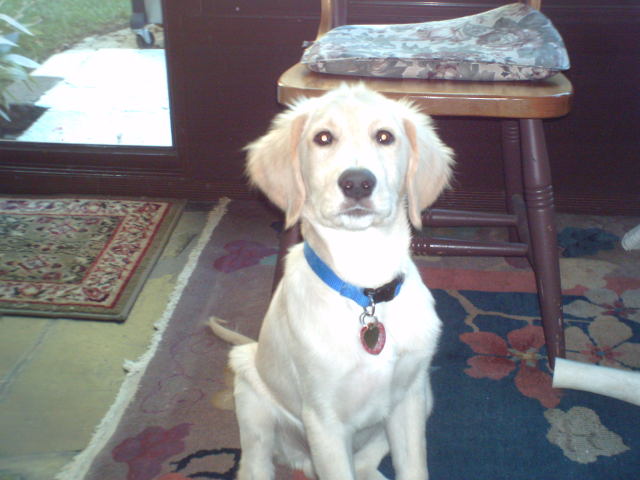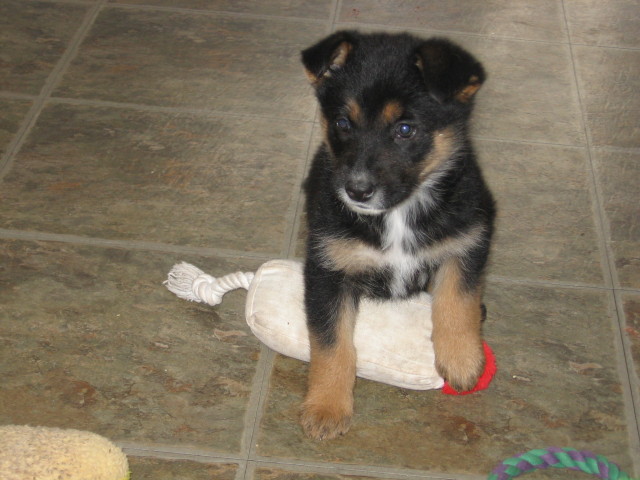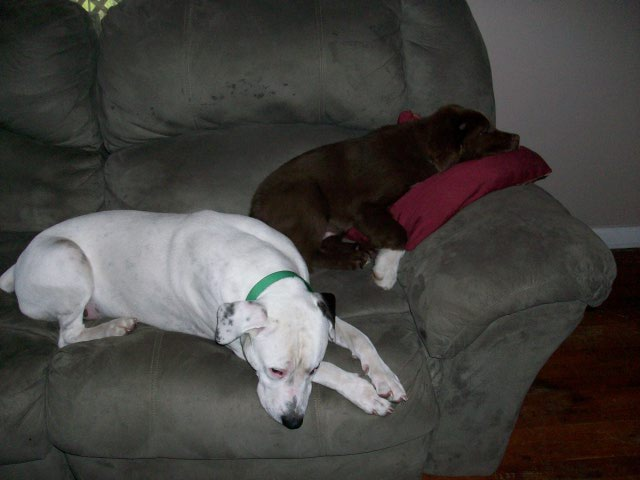QuestionQUESTION: I have a doxie who is almost two yrs. old now. I got him when he was about 7 mos. old and he is so afraid of our grand daughter who is 13. My other doxie loves her and she is wonderful with dogs, no problems. I have had doxies all my life but this problem is one I don't know how to fix. He runs under the bed when I bring her over and will not come out with any amount of coaxing, even when it is time for his meals. She spends alot of time with us so any help would be appreciated. My grand daughter is very cooperative about this problem but it would be nice for her to have a relationship with this dog. Neither of them are going away and I cannot imagine this going on forever. The dog is not aggressive in any way toward children but seems to be afraid even of my husband at times.
ANSWER: Fear of this sort is usually the result of conditioning. It takes only three seconds for a dog to acquire a strong conditioned response and this sort of problem is quite difficult to eliminate. I gather your grand daughter doesn't live with you, so there is no point in forcing this dog to interact with her, given his enormous fear. She's old enough to understand that something occurred in his life, that this has nothing to do with her, and that forcing him to interact with her will make it worse. As for the fear your dog sometimes shows toward your husband, this must be totally ignored (as it occurs), because attempting to soothe or calm the dog while he is in that state of mind is actually REWARDING the state of mind. So long as this behavior is not persistent and the dog can otherwise interact with your husband, SOMETHING is eliciting a conditioned fear response and only you can discover what that is by closely monitoring when it occurs, what your husband was doing, where he was standing, sitting, time of day, etc. Meanwhile, have your husband interact normally with this dog but especially allow this dog to see his interaction with the other dogs. By observing how his pack members (other dogs) are treated and how they interact, he will learn. It's not likely he will ever be the happy, well adjusted Doxie that your others seem to be, but no one's perfect...I'm sure you can forgive him and love him anyway.
---------- FOLLOW-UP ----------
QUESTION: My grand daughter is pretty much here everyday and stays overnight alot now that summer is here so is there any way to let him interact with her or ANYTHING that I can do to make this better? How does this conditioned response to her start when she never did anything to him? My daughter came over last night to let my dogs out and he would not come out from under the bed either. It seems to be getting worse. I am totally mystified as to how this even started and why. By the way, I do love him anyway. Thanks, any help would be appreciated.
AnswerA conditioned response is just that: in an instant, a dog can develop a fear of certain people, places, things, etc. that have no relevance to the people, places, things in his present environment. The dog should interact with the granddaughter only when he chooses to, not be forced in any way. She's old enough to understand that one must not take everything personally and that all living creatures have their idiocyncrasies. As for his reaction to your daughter, he was reacting out of fear. It's possible he anticipated being forced out of his hiding place (have you done that???) Now, if you're seriously interested in attempting to rehabilitate this situation, you need to do it in person with a certified animal behavior expert (NOT a dog trainer!) I would need to evaluate the dog's response to me over the course of at least an hour, observe his interaction with your other dogs and other human family members, and take an extensive behavioral and medical case history, as would any credentialed expert. Call the veterinary college closest to your location and ask for a referral to a Ph.D. or DVM who can come to your home (the DVM most likely won't.) I also suggest you talk to the veterinarian about this situation, since you say it seems to be getting worse. This could be a neurological problem or even a behavioral response to a physical problem. Find a talented veterinarian, not just your ordinary corner vet store, and ask for full blood chemistry, orthopedic and eye check, and neurological evaluation.

 my 7 month old golden changed for the worse
QuestionRiley at 6 months
QUESTION: I got a gold
my 7 month old golden changed for the worse
QuestionRiley at 6 months
QUESTION: I got a gold
 Nightmares?
Question
Beethoven
Hi Melissa, Ive had my very h
Nightmares?
Question
Beethoven
Hi Melissa, Ive had my very h
 puppy problems
QuestionQUESTION: I am the proud owner of 2 german shep
puppy problems
QuestionQUESTION: I am the proud owner of 2 german shep
 Companion for Lonley Westie
Question
Shannon
We have a 5-year-old neutered Westie w
Companion for Lonley Westie
Question
Shannon
We have a 5-year-old neutered Westie w
 American Bulldog aggression
Question
Buddy and Rez
I have a 2 year old Ameri
American Bulldog aggression
Question
Buddy and Rez
I have a 2 year old Ameri